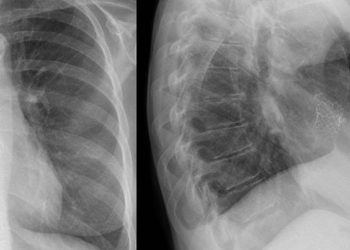Intravascular imaging-guided PCI has a lower mortality rate than angiography-guided PCI
1. In patients with complex coronary artery lesions, intravascular imaging-guided percutaneous coronary intervention (PCI) led to a lower risk of death from cardiac causes than angiography-guided PCI.
2. Intravascular imaging-guided PCI also led to a lower risk of target vessel-related myocardial infarction than angiography-guided PCI.
Evidence Rating Level: 1 (Excellent)
Study Rundown: PCI can lead to worse clinical outcomes in patients with complex artery lesions than in patients with simple lesions. During PCI, imaging with intravascular ultrasonography (US) and optical coherence tomography (OCT) can provide helpful information about lesion characteristics. Thus, procedural guidance with intravascular imaging may improve clinical outcomes after PCI for complex coronary artery lesions. However, there is a gap in knowledge as to whether intravascular imaging-guided PCI with the use of intravascular US or OCT would improve clinical outcomes compared to angiography-guided PCI in patients with complex coronary artery lesions. Overall, this study found that in patients with complex coronary artery lesions, intravascular imaging-guided PCI was associated with a lower cumulative incidence of a composite of death from cardiac causes, target-vessel related myocardial infarction, or clinically driven target vessel revascularization than angiography-guided PCI. This study was limited by the trial being unblinded as well as intravascular imaging defined stent optimization only occurring in 45.4% of the patients. Nevertheless, these study’s findings are significant, as they demonstrate that intravascular imaging-guided PCI is associated with less risk and improved clinical outcomes compared to angiography-guided PCI in patients with complex coronary artery lesions.
Click to read the study in NEJM
Relevant Reading: Fractional Flow Reserve or Intravascular Ultrasound for PCI
In-Depth [randomized open-label trial]: This randomized open-label trial was conducted at 20 sites in South Korea. Patients who were 19 years of age or older who were undergoing PCI for complex coronary-artery lesions were eligible for the study. Patients who did not have coronary lesions appropriate for PCI, had known contraindications to PCI, were pregnant, or were breastfeeding were excluded from the study. The primary outcome measured was a target-vessel failure. This was defined as a composite of death from cardiac causes, target-vessel–related myocardial infarction, or clinically driven target-vessel revascularization. Outcomes in the primary analysis were assessed via a log-rank test given an anticipated enrollment period of three years with an intention to treat basis. The median follow-up was 2.1 years (interquartile range, 1.4 to 3.0). The study demonstrated that a primary end-point event had occurred in 76 patients (cumulative incidence, 7.7%) in the intravascular imaging group and in 60 patients (cumulative incidence, 12.3%) in the angiography group (hazard ratio, 0.64; 95% confidence interval, 0.45 to 0.89). Death from cardiac causes occurred in 16 patients (cumulative incidence, 1.7%) in the intravascular imaging group and in 17 patients (cumulative incidence, 3.8%) in the angiography group. Target-vessel–related myocardial infarction occurred in 38 patients in the intravascular group (cumulative incidence, 3.7%) and 30 in the angiography group (cumulative incidence, 5.6%). In summary, this study demonstrates that intravascular imaging-guided PCI leads to a lower risk of death from cardiac causes, target vessel-related myocardial infarction, or clinically driven target vessel revascularization than angiography-guided PCI in patients with complex coronary artery lesions.
Image: PD
©2023 2 Minute Medicine, Inc. All rights reserved. No works may be reproduced without expressed written consent from 2 Minute Medicine, Inc. Inquire about licensing here. No article should be construed as medical advice and is not intended as such by the authors or by 2 Minute Medicine, Inc.







